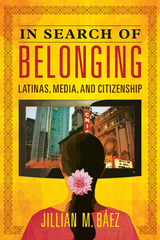4 books about Hispanic American mass media

Abject Performances
Aesthetic Strategies in Latino Cultural Production
Leticia Alvarado
Duke University Press, 2018
In Abject Performances Leticia Alvarado draws out the irreverent, disruptive aesthetic strategies used by Latino artists and cultural producers who shun standards of respectability that are typically used to conjure concrete minority identities. In place of works imbued with pride, redemption, or celebration, artists such as Ana Mendieta, Nao Bustamante, and the Chicano art collective known as Asco employ negative affects—shame, disgust, and unbelonging—to capture experiences that lie at the edge of the mainstream, inspirational Latino-centered social justice struggles. Drawing from a diverse expressive archive that ranges from performance art to performative testimonies of personal faith-based subjection, Alvarado illuminates modes of community formation and social critique defined by a refusal of identitarian coherence that nonetheless coalesce into Latino affiliation and possibility.
[more]

In Search of Belonging
Latinas, Media, and Citizenship
Jillian M Baez
University of Illinois Press, 2018
In Search of Belonging explores the ways Latina/o audiences in general, and women in particular, make sense of and engage both mainstream and Spanish-language media. Jillian M. Báez’s eye-opening ethnographic analysis draws on the experiences of a diverse group of Latinas in Chicago. In-depth interviews reveal Latinas viewing media images through a lens of citizenship. These women search for nothing less than recognition—and belonging—through representations of Latinas in films, advertising, telenovelas, and TV shows like Ugly Betty and Modern Family. Báez's personal interactions and research merge to create a fascinating portrait, one that privileges the perspectives of the women themselves as they consume media in complex, unpredictable ways.
Innovative and informed by a wealth of new evidence, In Search of Belonging answers important questions about the ways Latinas perform citizenship in today’s America.
[more]

Manufacturing Celebrity
Latino Paparazzi and Women Reporters in Hollywood
Vanessa Diaz
Duke University Press, 2020
In Manufacturing Celebrity Vanessa Díaz traces the complex power dynamics of the reporting and paparazzi work that fuel contemporary Hollywood and American celebrity culture. Drawing on ethnographic fieldwork, her experience reporting for People magazine, and dozens of interviews with photographers, journalists, publicists, magazine editors, and celebrities, Díaz examines the racialized and gendered labor involved in manufacturing and selling relatable celebrity personas. Celebrity reporters, most of whom are white women, are expected to leverage their sexuality to generate coverage, which makes them vulnerable to sexual exploitation and assault. Meanwhile, the predominantly male Latino paparazzi can face life-threatening situations and endure vilification that echoes anti-immigrant rhetoric. In pointing out the precarity of those who hustle to make a living by generating the bulk of celebrity media, Díaz highlights the profound inequities of the systems that provide consumers with 24/7 coverage of their favorite stars.
[more]

Spanish-Language Newspapers in New Mexico, 1834-1958
A. Gabriel Meléndez
University of Arizona Press, 2005
For more than a century, Mexican American journalists used their presses to voice socio-historical concerns and to represent themselves as a determinant group of communities in Nuevo México, a particularly resilient corner of the Chicano homeland. This book draws on exhaustive archival research to review the history of newspapers in these communities from the arrival of the first press in the region to publication of the last edition of Santa Fe’s El Nuevo Mexicano.
Gabriel Meléndez details the education and formation of a generation of Spanish-language journalists who were instrumental in creating a culture of print in nativo communities. He then offers in-depth cultural and literary analyses of the texts produced by los periodiqueros, establishing them thematically as precursors of the Chicano literary and political movements of the 1960s and ’70s.
Moving beyond a simple effort to reinscribe Nuevomexicanos into history, Meléndez views these newspapers as cultural productions and the work of the editors as an organized movement against cultural erasure amid the massive influx of easterners to the Southwest. Readers will find a wealth of information in this book. But more important, they will come away with the sense that the survival of Nuevomexicanos as a culturally and politically viable group is owed to the labor of this brilliant generation of newspapermen who also were statesmen, scholars, and creative writers.
Gabriel Meléndez details the education and formation of a generation of Spanish-language journalists who were instrumental in creating a culture of print in nativo communities. He then offers in-depth cultural and literary analyses of the texts produced by los periodiqueros, establishing them thematically as precursors of the Chicano literary and political movements of the 1960s and ’70s.
Moving beyond a simple effort to reinscribe Nuevomexicanos into history, Meléndez views these newspapers as cultural productions and the work of the editors as an organized movement against cultural erasure amid the massive influx of easterners to the Southwest. Readers will find a wealth of information in this book. But more important, they will come away with the sense that the survival of Nuevomexicanos as a culturally and politically viable group is owed to the labor of this brilliant generation of newspapermen who also were statesmen, scholars, and creative writers.
[more]
READERS
Browse our collection.
PUBLISHERS
See BiblioVault's publisher services.
STUDENT SERVICES
Files for college accessibility offices.
UChicago Accessibility Resources
home | accessibility | search | about | contact us
BiblioVault ® 2001 - 2024
The University of Chicago Press









